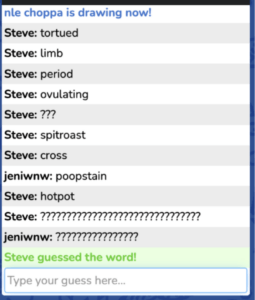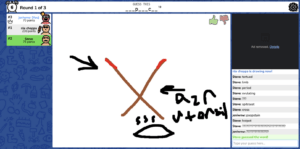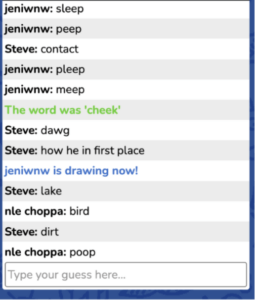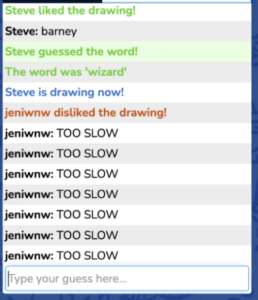Skribbl.io is an online guessing game created by ticedev where one player makes a drawing of a word under a given time frame that other players guess. Seemingly an online version of Pictionary, the game’s target audience is intended for all ages and can be played with at least two players – I played it with three.
Central Argument
In skribbl.io, judging is left to the players as an inherent dynamic rather than a central mechanic, with multiple avenues for judging including the like/dislike button and open chat adding an informal judging process apart from the win condition of correctly guessing the drawing. As a result, the game utilizes a blend of informal and formal judging components to foster an environment of mixed competition and collaboration, supported by the game’s open player communication and the point system. The urgency of the added time pressure along with higher player agency and communication than other guessing games like Pictionary and Charades allows players to individually accomplish a challenge through potentially unintended fellowship.
Informal Judging through skribbl.io’s Chat Box
By creating a chat box with constant feed rather than a simple submission box in the center of the screen, skribbl.io allows for more emotional player interactions and increased transparency between the guessers and the artist. The design itself is shaped like that of a regular live chat forum with smaller text, while other drawing guessing games like Drawize intend for players to type directly into the slots of each letter of the word they are attempting to guess.

As seen in the picture above, the chat box is visible to all players and provides feedback loops on whether the guesses are correct. However, in an environment with much urgency from mechanics like the timer on the top left of the screen and points that are awarded to whoever guesses correctly the fastest, there is a dynamic of emotional bonding and expression towards the artist’s drawing that can be communicated through the chat. These can be feelings of frustration when the timer gets closer to 0, such as presented above with 6 seconds left on the clock and the chat box filled with question marks, urging the artist to draw more. In this case, the players’ shared frustration in the chat box is ultimately an informal judging component conducive to the aesthetic of fellowship, where visible and open communication allows for emotional bonding and players verifying that their individual “judgment” of the drawing is supported. Thus, skribbl.io’s use of informal judging in the chat box transitions the game from an initial competition to one that’s collaborative when there is greater urgency and challenge.
The Role of Judging within the Point System
Another central mechanic to judging in skribbl.io is the point system, which, although arguably balanced for both the artist and the players, encourages rule breaking that ultimately favors the appeal of fellowship at the expense of challenge and expression.

The point system rewards the artist for the amount of players guessing and how quickly a player guesses the word, and the visible chat box with live player guesses allows the artist to strategize the most easily understood drawing to beat the time limit while updating their artwork based on player feedback and the direction of their guesses – essentially, the artist relies on the judgment of the other players. As seen in the picture below, the artist draws an arrow to point to the part of the drawing that wasn’t being focused on in the chat. Thus, this spurs collaboration between the artist and the guessers, appealing to the aesthetic of fellowship and giving artists a sense of accomplishment for when players can guess their drawings quickly.
However, the point system is flawed in that skribbl.io is ultimately a game where multiple individual players compete for fastest to guess, in which the resources given to the players are a timer, the amount of letters in the word to guess, and instant feedback on whether the input was wrong or almost correct. This means that players can simply be awarded points for spamming the chat box and guessing the right word before the artist has even started drawing – this is something that I, too, have done in later rounds, as seen in the picture below. This dynamic of guessing removes any aspect of judging from the game and, as a result, fails to appeal to challenge. Additionally, if the artist notices that there is negative or insufficient judgment towards their drawing, they may simply choose to write out the word, failing once again to appeal to challenge and expression. Thus, we see that this mixture of competition and collaboration to earn points stems from how informal judgment is received within the game.

Points of Consideration
Skribbl.io should take into consideration how much open and visible judgment is too much, as there are currently no limits for spamming or writing inappropriate words, as seen below when I vented my own frustration out on a friend. There are formal judgment mechanics like the dislike and like buttons, but these carry no weight in the game play or win condition, and, thus, the buttons can be used to distract and discourage the artist as well – this is what I consider to be negative judgment. Aside from implementing chat limits, I recommend ways for players to give positive judgment that carry weight, such as if the like and dislike buttons could only be used after the round has been completed and with the added ability to give points to players based on the quality of their drawings.

Some other points of improvement would center around how to reinforce existing rules such as not writing out words or symbols to appeal to the aesthetic of Challenge without shortcuts or rule breaking. With users running and “judging” the game, skribbl.io can consider a formal judging mechanic where players can earn points from calling out a drawing for breaking the rules. Afterall, since judging is in the hands of the players, they can inherently be their own moderators.



